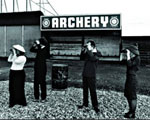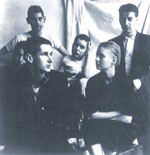
“Down by the railway
line
He’s sitting in his old grey coat
And all the people come to ask him questions
Over again.
He gave away his house and clothes
And all the money that he had
The day the last train ran through our town
Some think he’s very wise
But I know otherwise
That man’s a fool
As he’s forgotten love.
He’s always cold though the sun might shine
Sits in the same place if it’s rain or fine
Sits where he lost his girl
To the railway line
He didn’t love and he couldn’t give
And still he seeks his peace inside
And still he wonders why,
He feels so cold.
And in the town there once were trains
The people hurry to and fro.
They think somehow this man
Can make them happy again.
They look for answers in his eyes.
They look for answers in the way he sighs.
And think that somehow that sorrow
Makes you very wise.”
It’s not that often that reading songwords cold on a page works for me but I love the lyrics to this song Omnichord, and this Pram song is poetry in a way few are. It hits all those spots that Larkin or Beckett ought to. Pram’s Rosie Cuckston is one of the best lyricists in pop. She doesn’t make a big thing about it, but her words conjure up special places like Angela Carter and jean Rhys could.
Rosie also has one of the most unique voices in pop, and not just because she sounds so classically wrong that it’s so right. It’s wrong and right like Astrid Gilberto, Francoise Hardy, and the Raincoats. It’s very much her own voice. Rosie avoids the urge to emote, to shout to be heard. It’s only natural.

For if the political climate of the 1980s did one thing it allowed a generation of outsiders to evolve that didn’t need to compete. With the eternal curiosity of kids, these outsiders were able to accumulate junk, whether it be books, records, instruments, abandoned gadgets, cast-off clothes, odd ornamentation. One man’s rubbish was another’s essential ephemera.
As the ‘80s became the ‘90s the interesting pockets of activity were centred around people like Stereolab and Saint Etienne who were cultural magpies, obsessed collectors, who couldn’t resist sharing new discoveries, and incorporating ideas and new found sounds into song structures.
Thus many people owe a huge debt to people like Tim Gane and Bob Stanley for broadening horizons, opening up new vistas, and creating diversions into a world of ‘60s Brit girls, the french yeh yeh sound, continental soundtracks, absurdly orchestrated sunshine sounds, intricate harmony pop, glam nuggets, radiophonic workshops, electronic library music, krautrock, brazilian baroque, and all sorts of other arcane exotica.
And right there in the thick of it were Pram, who have been described as Birmingham’s answer to Sun Ra’s Arkestra. Certainly the development of Pram is one of the stranger stories, and if any group embodies that obsession with junk and clutter then it’s Pram. There is a possibly apocryphal tale of how Rosie was sharing living quarters in London with members of Stereolab and Broadcast and was steadily encroaching on the space of others with her collections of old furniture, kids instruments, ironing boards, keyboards and whatever until it all ended in disharmony, with Rosie returning to Birmingham to pen poison words.
And interestingly for all the cock-eyed innocence and fairy tale feel of a Pram song, there is something of a sinister twisted sense, in the classic tradition of nursery rhymes where we don’t realise what we’re singing. “You’d always thought you’d live alone in the safety of your dreams, but that left me out in the cold naked and fragile I couldn’t leave,” sings Rosie on the early Pram favourite Eggshells.
I’m glad that the only time I saw Pram play was in the unusual setting of a bookshop. It seemed appropriate somehow. I liked the fact that they seemed to be playing a bizarre collection of instruments, a trumpet here, a theremin there, a beaten up old keyboard perched on an ironing board. It was so refreshing, and in stark contrast to the stifling sheen of pop that has scared me since Scritti’s Songs To Remember and I first heard Heaven 17.

Despite having a hugely loyal cult following Pram perhaps not surprisingly never sold that many records, but their influence has helped shaped the sound of others, like close comrades Broadcast. When before one of the key 2006 World Cup games Broadcast’s Come On Let’s Go was used to, ahem, score very effectively a collage of clips it will have made many an underground pop fan drop their drink, but it sounded so natural that it reminded of an argument I put forward vehemently so many times that if people at large actually heard the likes of the Raincoats, Blue Orchids, June Brides, Pram, perhaps they would accept the oddness at face value and embrace the creativity and love the special sounds.
Broadcast most certainly will have had their sound shaped by the example of Pram. Broadcast however are most definitely more conventionally beautiful, photogenic and easy on the ear, with the experimentation and the pop more clearly separated. Like Pram though their sound developed incrementally and impressively, artfully absorbing influences but cannily creating something unique.
With Trish Keenan looking ever more like an alluringly lost and unattainable singer from a psychedelic folk outfit the whole Broadcast experience took on an incredibly important aesthetic significance. Much of that will have been down to the artwork of designer Julian House, who extended his obsession with how a record should look being part of the complete pop experience into his own work with the bespoke Ghost Box imprint. The label’s CDRs were gorgeous works of art which looked as perfect as aged Penguin paperbacks. The records, by for instance House’s own Focus Group, took many of the interests of the Broadcast/Pram/Stereolab/St Etienne axis, stripped the sound of songs, accentuate the scratchy library samples, haunted science, and an idyllic English arcadia.
Then you remember the tremendous impact words in a song can have. Sing it Rosie …
“If I could shake off this feeling
Of being guilty for living
Of never doing what others wanted
Of simply being inconvenient
Then suddenly the sun could warm me
To the marrow of my skeleton and
My mind could ride the breezes
Hover and flutter in the warm air.”
©
2006 John Carney